In den letzten 16 Jahren, in denen wir unsere eigenen Websites und Marken verwaltet haben, haben wir gelernt, wie wichtig es ist, regelmäßig Sicherungskopien Ihrer Websites zu erstellen. Backups helfen Ihnen, Ihre Website wiederherzustellen, falls etwas schiefgeht, z. B. ein Cyberangriff, versehentliches Löschen von Daten oder andere ungeplante Ereignisse.
Allerdings ist die Wiederherstellung von WordPress aus einer Sicherungsdatei für Anfänger nicht einfach. Egal, ob Sie ein Plugin verwenden oder Backups manuell wiederherstellen, es können Fehler auftreten. Zum Glück haben wir viel Erfahrung damit, Benutzern mit WordPress und Backups zu helfen.
In diesem Artikel zeigen wir Ihnen Schritt für Schritt, wie Sie WordPress sicher aus einem Backup wiederherstellen können.
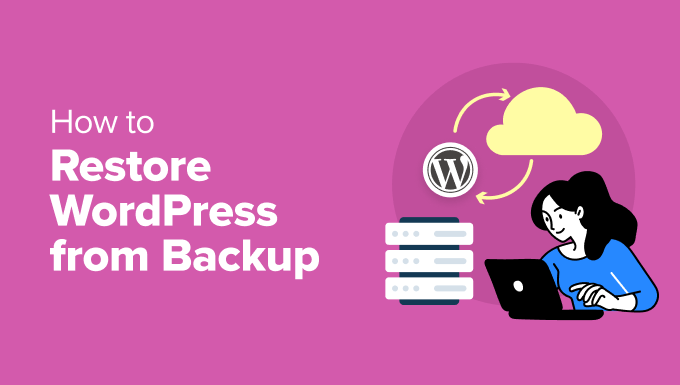
Verständnis von Backups und Wiederherstellung von WordPress
Es gibt verschiedene Möglichkeiten, Backups für Ihre WordPress-Website zu erstellen. Unserer Meinung nach ist der beste Weg, dies mit einem WordPress-Backup-Plugin zu tun.
Sie können aber auch eine manuelle Sicherung Ihrer WordPress-Datenbank erstellen und Ihre WordPress-Dateien mit einem FTP-Client herunterladen.
Die Wiederherstellung von WordPress aus Backups hängt ganz davon ab, wie Sie das Backup erstellt haben. Backups, die mit Duplicator Pro erstellt wurden, können zum Beispiel mit demselben Plugin wiederhergestellt werden. Ebenso müssen manuelle Backups manuell wiederhergestellt werden.
Viele WordPress-Benutzer erstellen keine Sicherungskopien ihrer gesamten Website. Stattdessen sichern sie nur ihr WordPress-Theme, das Uploads-Verzeichnis und die WordPress-Datenbank. Dies verringert zwar die Größe des Backups, erhöht aber den Aufwand für die Wiederherstellung der Website.
Unabhängig davon, wie Sie Ihr Backup erstellen, sind die grundlegenden Schritte die gleichen.
Pro-Tipp: Wenn Sie nicht die Zeit oder die technischen Fähigkeiten haben, um Ihre WordPress-Website nach einem Cyber-Hacking-Ereignis oder einem anderen Online-Sicherheitsnotfall wiederherzustellen, machen Sie sich keine Sorgen, wir können Ihnen helfen.
Wenn Sie unsere professionellen Reparaturdienste für gehackte Websites in Anspruch nehmen, bereinigen wir Ihre Website in Rekordzeit. Auf diese Weise wird Ihre Website nur minimale Ausfallzeiten haben, und Sie können die Auswirkungen auf Ihre Besucher reduzieren. Wir bieten sogar eine optimierte Option an, die sicherstellt, dass Ihre Website innerhalb von 1 Werktag wiederhergestellt ist.
Schauen wir uns nun an, wie Sie Ihre WordPress-Website aus einem Backup wiederherstellen können. Hier ist ein kurzer Überblick über das, was wir in diesem Artikel erklären werden:
- What to Do Before You Restore WordPress From Backup
- Restoring WordPress Using Duplicator Pro
- Restoring WordPress From UpdraftPlus Backup File
- Restoring WordPress Database From Backup Using phpMyAdmin
- Restoring WordPress Database Backup Using cPanel
- Manually Restoring WordPress Files Using FTP
- Troubleshooting WordPress Backup Restore Issues
- Things to Do After Restoring Your WordPress Site
- FAQs About Restoring WordPress Backups
Hinweis: In dieser Anleitung geht es um die Wiederherstellung einer WordPress-Website aus einem Backup. Wenn Sie versuchen, Ihre Website auf eine neue Domain zu verschieben, dann sollten Sie sich unseren Leitfaden zum Verschieben von WordPress auf eine neue Domain ohne SEO-Verlust ansehen.
Oder wenn Sie versuchen, von einem Localhost zu einem Live-Webhosting-Konto umzuziehen, dann folgen Sie dieser Anleitung, wie man WordPress von einem lokalen Server zu einer Live-Site umzieht.
Was Sie tun müssen, bevor Sie WordPress aus einem Backup wiederherstellen
Bevor wir auf die verschiedenen Möglichkeiten zur Wiederherstellung von WordPress aus einem Backup eingehen, sollten wir die Schritte besprechen, die Sie zuerst ausführen müssen.
Natürlich sollten Sie bereits eine Sicherungskopie Ihrer WordPress-Website erstellt haben, die Sie sofort einsetzen können. Mehr dazu erfahren Sie in unserem Leitfaden zum Sichern einer WordPress-Website.
Wenn Ihre Sicherungen an einem entfernten Speicherort wie Dropbox, Google Drive oder OneDrive gespeichert sind, können Sie Ihre Sicherungsdateien von diesen Speicherorten auf Ihren Computer herunterladen.
Außerdem müssen Sie möglicherweise auch alte WordPress-Dateien löschen und eine Neuinstallation vornehmen. Wenn Ihre Website mit Malware infiziert war, beschädigte Dateien hatte oder etwas fehlte, wird es automatisch entfernt und bereinigt.
Denken Sie daran, dass Sie dies nur tun sollten, wenn Sie sicher sind, dass Ihr Backup auf dem neuesten Stand ist und Sie alle Ihre Anpassungen und Uploads gespeichert haben.
Sie können Dateien mit cPanel oder FTP löschen. Wenn Sie die Möglichkeit haben, empfehlen wir die Verwendung von cPanel, da dies schneller ist.
Loggen Sie sich einfach in das cPanel Ihres Hosting-Dashboards ein. Klicken Sie dann unter dem Abschnitt „Dateien“ auf das Symbol „Dateimanager“.
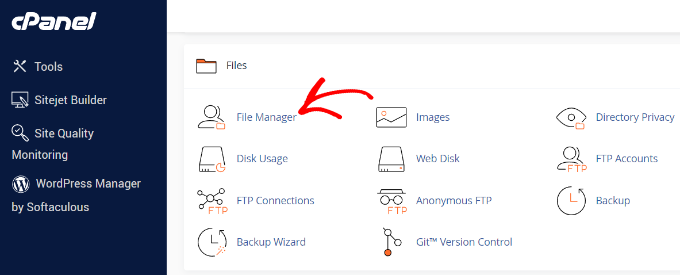
Die Oberfläche des Dateimanagers wird nun in einer neuen Browser-Registerkarte geöffnet.
Sie müssen alle WordPress-Dateien auswählen und sie löschen. Sobald alle Dateien ausgewählt sind, klicken Sie einfach auf die Option „Löschen“.
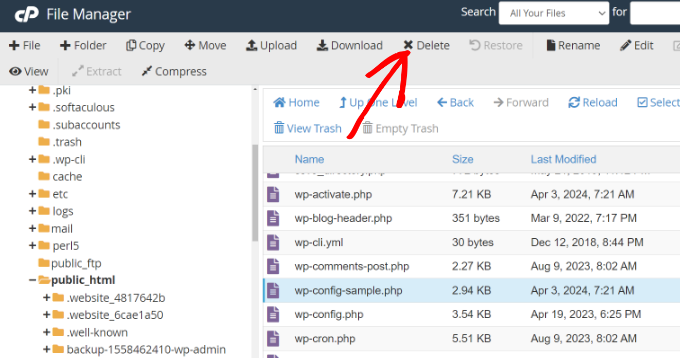
Sie können Dateien auch mit FTP-Clients löschen, aber dieser Vorgang ist viel langsamer.
Wenn Sie noch nie mit FTP gearbeitet haben, lesen Sie bitte unsere Anleitung, wie Sie FTP zum Hochladen von Dateien in WordPress verwenden.
Verbinden Sie sich dazu einfach über einen FTP-Client mit Ihrer Website. Wählen Sie dann alle Dateien in Ihrem WordPress-Stammverzeichnis aus, klicken Sie mit der rechten Maustaste auf den Bildschirm und wählen Sie die Option „Löschen“, um sie zu entfernen.
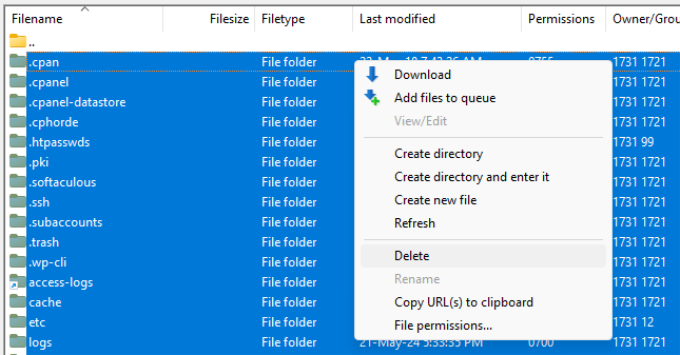
Nachdem Ihre Dateien gelöscht wurden, müssen Sie WordPress erneut installieren und sich bei Ihrer Website anmelden. Der Installationsvorgang hängt von Ihrem Hosting-Anbieter ab. Weitere Einzelheiten finden Sie in unserem Leitfaden zur richtigen Installation von WordPress.
Denken Sie daran, dass der Installationsprozess davon abhängt, welche Methode Sie verwenden, aber er sollte bei jedem nicht-manuellen Ansatz sehr einfach sein. Wir werden später kurz auf die Schritte zur Installation von WordPress eingehen, wenn Sie Ihr Backup manuell wiederherstellen.
Jetzt sind Sie bereit, WordPress-Backups wiederherzustellen.
WordPress mit Duplicator Pro wiederherstellen
Duplicator Pro ist eines der besten WordPress-Backup-Plugins. Es macht es sehr einfach, Ihre Website zu migrieren und zu sichern.
Zunächst müssen Sie sicherstellen, dass Sie ein vollständiges Backup Ihrer WordPress-Website mit Duplicator erstellt haben.
Als Nächstes müssen Sie die Backup-Archivdatei auf Ihren Computer herunterladen. Dies ist eine vollständige Kopie Ihrer WordPress-Dateien, die Themes, Plugins, Einstellungen und mehr enthält.
Sobald Ihre Sicherungsdateien fertig sind, müssen Sie als Nächstes das Duplicator Pro-Plugin installieren und aktivieren. Weitere Einzelheiten finden Sie in unserer Anleitung zur Installation eines WordPress-Plugins.
Wichtiger Hinweis: Es gibt auch ein einfacheres Duplicator-Plugin, das Ihnen kostenlos nützliche Sicherungs- und Migrationsfunktionen bietet. Um jedoch das Plugin zur Wiederherstellung dieser Backups zu verwenden und diesem Tutorial zu folgen, benötigen Sie einen Premium-Plan für Duplicator Pro.
Nach der Aktivierung können Sie von Ihrem WordPress-Dashboard aus zu Duplicator Pro “ Backups importieren gehen. Als Nächstes können Sie die Archivdatei hochladen, indem Sie sie einfach per Drag-and-Drop ziehen oder auf die Schaltfläche „Datei auswählen“ klicken.
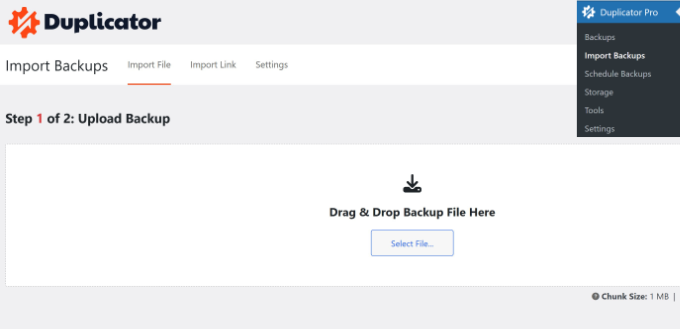
Das Plugin wird nun die Archivdatei hochladen und Ihnen die Details anzeigen.
Sie können die Angaben überprüfen und dann auf die Schaltfläche „Weiter“ klicken.
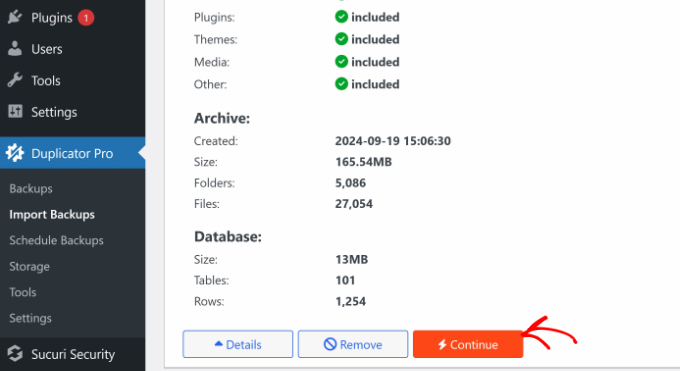
Als Nächstes müssen Sie einen Wiederherstellungspunkt festlegen, um Ihre Website schnell auf ein früheres Datum zurückzusetzen.
Sobald das erledigt ist, können Sie auf die Schaltfläche „Einstellen“ klicken.
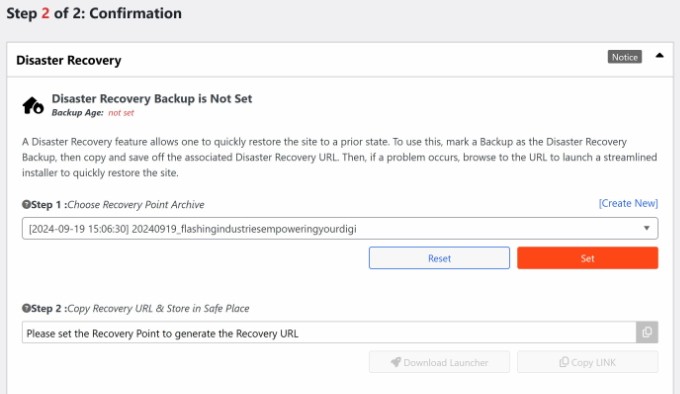
Danach erhalten Sie eine Wiederherstellungs-URL, die Sie speichern können, um sie in Zukunft jederzeit zu verwenden.
Von hier aus können Sie nach unten scrollen und auf die Schaltfläche „Installer starten“ klicken.
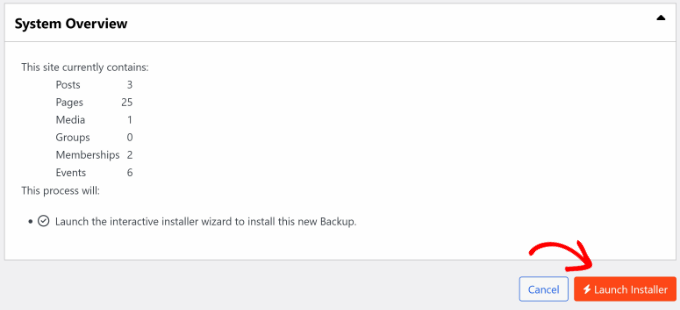
Als nächstes müssen Sie das Paket bereitstellen. Das Plugin gibt einen Überblick über die Installationsdetails und lässt Sie zwischen„Vollständige Installation einer einzelnen Website“ und „Wiederherstellung einer einzelnen Website“ wählen.
Wählen Sie die Option „Einzelne Site wiederherstellen“ und klicken Sie auf die Schaltfläche „Validieren“.
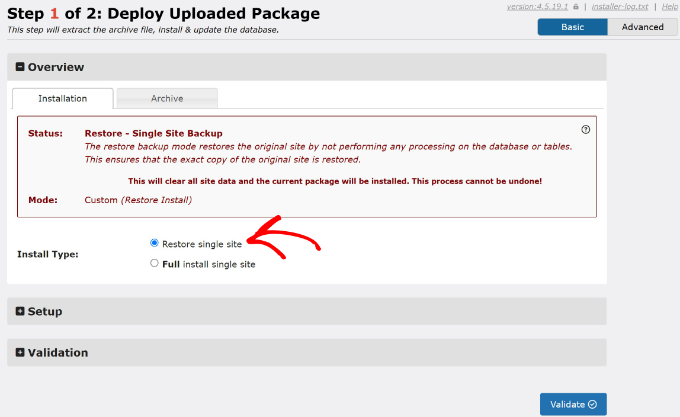
Sobald die Validierung abgeschlossen ist, müssen Sie das Kontrollkästchen anklicken, um die Bedingungen und Hinweise zu akzeptieren.
Klicken Sie anschließend einfach auf die Schaltfläche „Weiter“.
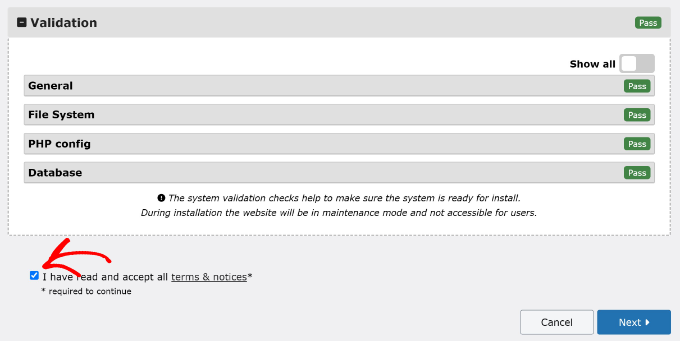
Es wird nun ein neues Fenster mit einer Installationsbestätigung angezeigt.
Sie können auf die Schaltfläche „OK“ klicken, um fortzufahren.
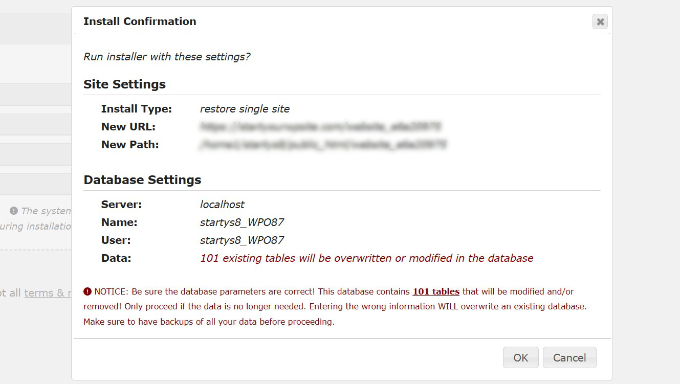
Das Installationsprogramm extrahiert nun Ihre Backup-Archivdateien. Sobald dies geschehen ist, sollten Sie die Installationsergebnisse sehen.
Sie können einfach auf die Schaltfläche „Admin Login“ klicken, um die Installation Ihres Backups abzuschließen.
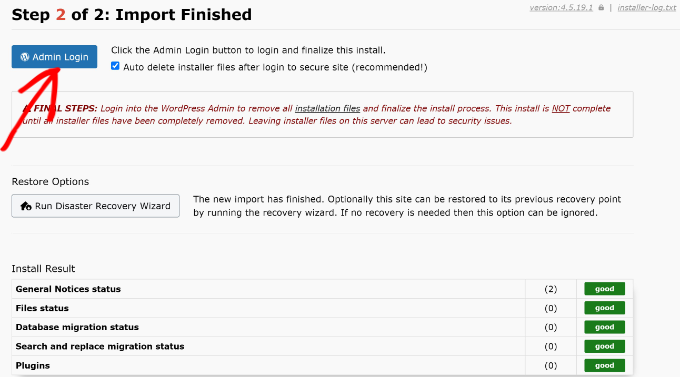
Melden Sie sich in Ihrem WordPress-Dashboard an.
Das war’s! Sie haben Ihre WordPress-Website nun erfolgreich von einem Duplicator-Backup wiederhergestellt.
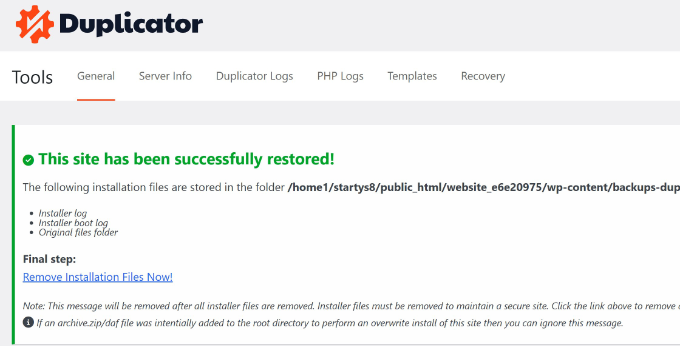
Wiederherstellung von WordPress aus einer UpdraftPlus-Backup-Datei
UpdraftPlus ist ein weiteres beliebtes Premium-Plugin für WordPress-Backups. Wenn Sie UpdraftPlus zum Erstellen von Backups verwendet haben, dann ist dieser Abschnitt für Sie.
UpdraftPlus bietet eine sehr bequeme Möglichkeit, WordPress aus einem Backup wiederherzustellen. Sie müssen sich in Ihre WordPress-Website einloggen und die Seite Einstellungen “ UpdraftPlus-Backups aufrufen.
Von hier aus können Sie in den Plugin-Einstellungen auf die Registerkarte „Sichern/Wiederherstellen“ gehen.
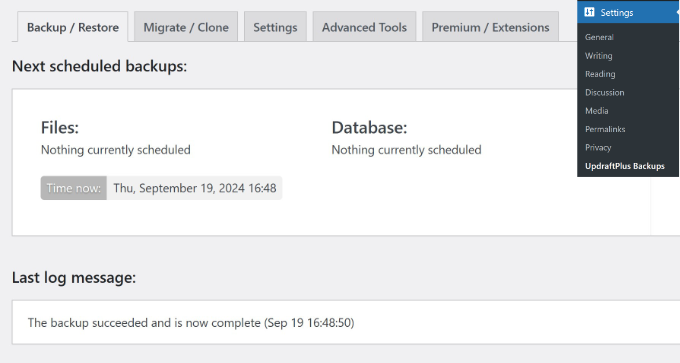
Als Nächstes müssen Sie zum Abschnitt „Vorhandene Sicherungen“ hinunterblättern.
Wenn Sie bereits eine Sicherungsdatei von UpdraftPlus haben, sollten Sie sie in diesem Abschnitt sehen. Klicken Sie einfach auf die Schaltfläche „Wiederherstellen“ für die Sicherung, die Sie installieren möchten. Alternativ können Sie auch auswählen, Sicherungsdateien von Ihrem Computer oder Cloud-Speicher hochzuladen.

Danach müssen Sie die Komponenten auswählen, die Sie wiederherstellen möchten. Zu diesen Optionen gehören Plugins, Themes, Uploads, unbedingt benötigte Plugins und andere.
Klicken Sie einfach auf die Schaltfläche „Weiter“, nachdem Sie Ihre Auswahl getroffen haben.
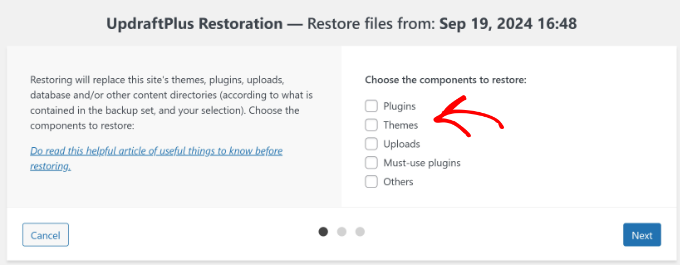
Das Plugin wird dann die Sicherungsdatei verarbeiten.
Sobald es fertig ist, können Sie auf die Schaltfläche „Wiederherstellen“ klicken.

Das Plugin beginnt dann mit der Wiederherstellung der Komponenten, die Sie zuvor ausgewählt haben.
Sobald der Vorgang abgeschlossen ist, erhalten Sie die Meldung „Wiederherstellung erfolgreich“. Das Plugin zeigt auch ein Aktivitätsprotokoll an, damit Sie die wiederhergestellten Dateien verfolgen können.
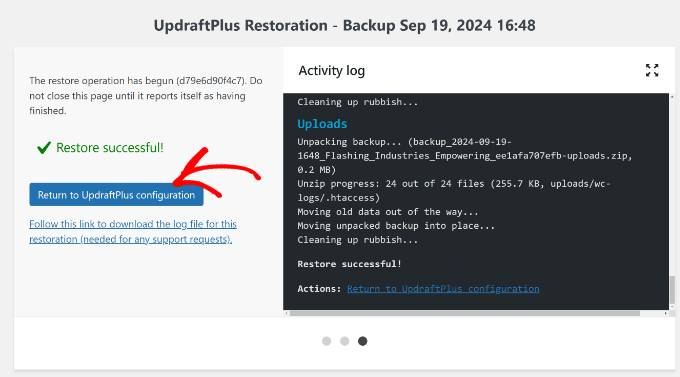
Klicken Sie einfach auf die Schaltfläche „Zurück zur UpdraftPlus-Konfiguration“, um fortzufahren.
Wenn Sie zur Plugin-Seite im WordPress-Dashboard zurückkehren, sehen Sie, dass das Backup wiederhergestellt wurde.
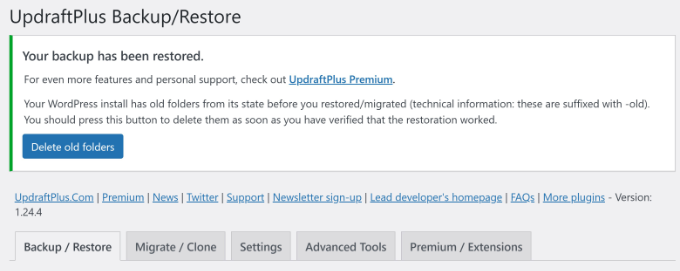
UpdraftPlus bietet Ihnen auch die Möglichkeit, alte Ordner der vorherigen WordPress-Installation zu löschen. Sie können diese Ordner einfach entfernen, indem Sie auf die Schaltfläche „Alte Ordner löschen“ klicken, falls Sie dies nicht bereits getan haben.
Das war’s. Sie haben erfolgreich ein Backup mit UpdraftPlus wiederhergestellt.
Wiederherstellung der WordPress-Datenbank aus einem Backup mit phpMyAdmin
Wenn Sie eine manuell erstellte Sicherungskopie wiederherstellen wollen, haben Sie zwei Möglichkeiten zur Auswahl. Sie können entweder eine neue Datenbank erstellen und Ihre Sicherung in diese importieren, oder Sie können Ihre bestehende Datenbank leeren und die Sicherung importieren.
Wenn Sie eine gehackte WordPress-Website säubern, ist es sehr wichtig, Ihren MySQL-Benutzernamen und Ihr Passwort zu ändern, bevor Sie eine neue Datenbank erstellen oder sie in eine bestehende Datenbank importieren.
Um eine neue Datenbank zu erstellen, loggen Sie sich in das cPanel-Dashboard Ihres WordPress-Hosting-Accounts ein und klicken Sie auf das Symbol „MySQL-Datenbanken“.
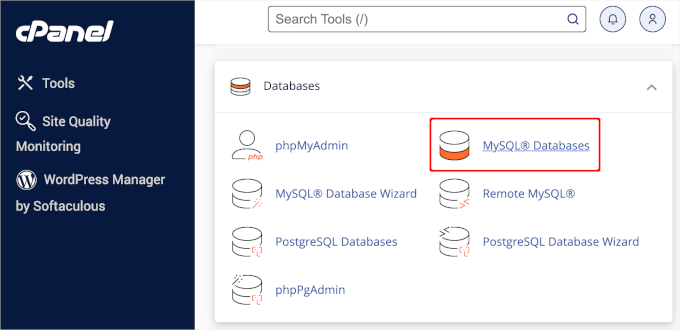
Als nächstes werden Sie aufgefordert, einen Namen für Ihre Datenbank anzugeben.
Klicken Sie anschließend auf die Schaltfläche „Datenbank erstellen“.
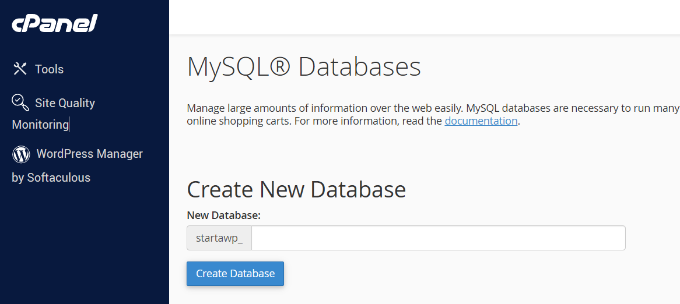
Nachdem Sie die neue Datenbank erstellt haben, benötigen Sie einen MySQL-Benutzer, der mit dieser neuen Datenbank verknüpft ist.
Blättern Sie einfach nach unten zum Abschnitt „MySQL-Benutzer“ und fügen Sie einen neuen Benutzer hinzu.
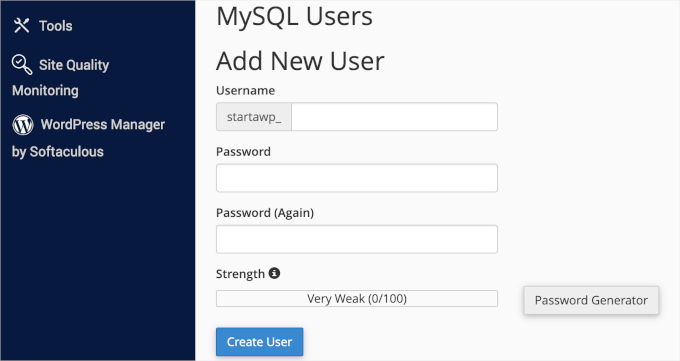
Als nächstes müssen Sie diesen Benutzer zur MySQL-Datenbank hinzufügen.
Blättern Sie zum Abschnitt „Benutzer zur Datenbank hinzufügen“, wählen Sie den Benutzer und die Datenbank aus den Dropdown-Menüs aus und klicken Sie dann auf die Schaltfläche „Hinzufügen“.
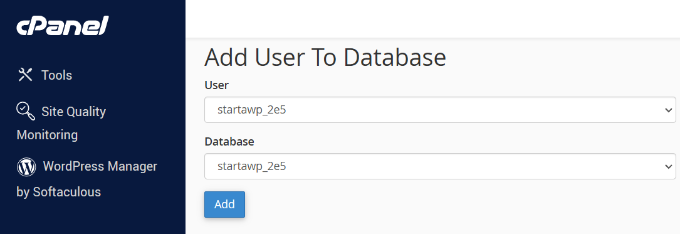
Jetzt ist Ihre neue Datenbank fertig. Sie können sie verwenden, um die Sicherung Ihrer WordPress-Datenbank wiederherzustellen.
Gehen Sie wieder zum cPanel-Dashboard und klicken Sie auf„phpMyAdmin“ unter „Datenbanken“.
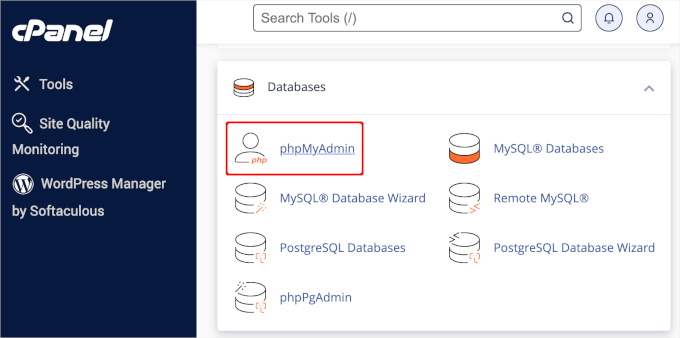
Als nächstes sehen Sie den phpMyAdmin-Bildschirm.
Klicken Sie auf die Registerkarte „Importieren“ am oberen Rand des Bildschirms.
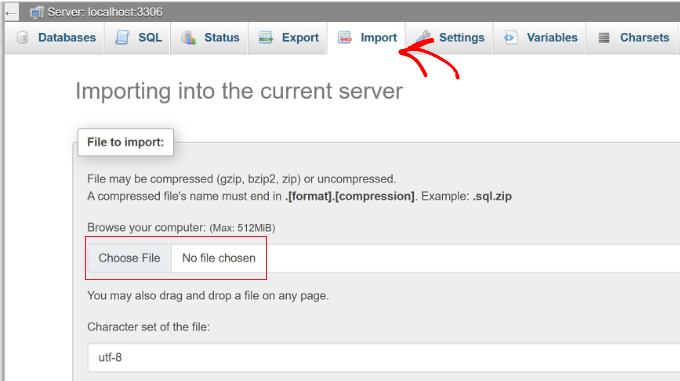
Klicken Sie dann einfach auf die Schaltfläche „Datei auswählen“, um Ihre WordPress-Datenbank-Sicherungsdatei auszuwählen. Danach klicken Sie auf die Schaltfläche „Go“ unten auf der Seite, um fortzufahren.
phpMyAdmin wird nun Ihr Backup hochladen und in Ihre Datenbank importieren. Nach Abschluss des Vorgangs erhalten Sie eine Erfolgsmeldung.
Das war’s! Sie haben Ihre WordPress-Datenbank erfolgreich importiert.
Der nächste Schritt ist die Installation von WordPress mit Ihrer neuen Datenbank. Wenn Sie WordPress bereits installiert haben, fügen Sie einfach die neuen Datenbankeinstellungen in die Dateiwp-config.php ein, und schon können Sie loslegen.
Wiederherstellung der WordPress-Datenbank-Sicherung mit cPanel
Wenn Sie eine WordPress-Datenbank-Sicherung manuell über das cPanel in Ihrem Shared Hosting erstellen, können Sie diese Datenbank auch über das cPanel selbst wiederherstellen.
Melden Sie sich zunächst bei Ihrem cPanel-Konto an. Klicken Sie unter dem Abschnitt „Dateien“ auf „Backup“.
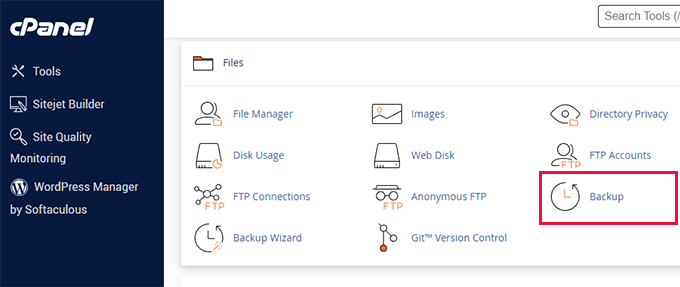
Scrollen Sie auf der Seite „Backups“ nach unten zu „Wiederherstellen eines MySQL-Datenbank-Backups“.
Klicken Sie anschließend auf die Schaltfläche „Datei auswählen“ und wählen Sie die Sicherungsdatei von Ihrer Festplatte aus. Klicken Sie dann einfach auf die Schaltfläche „Hochladen“.
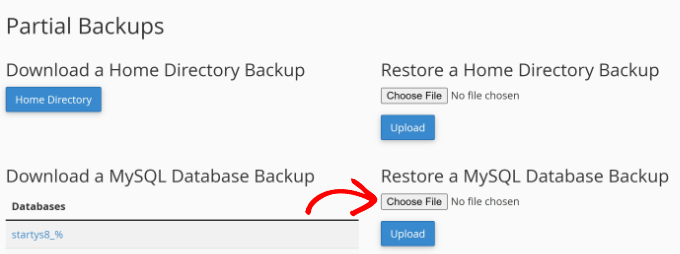
So einfach ist das!
Manuelle Wiederherstellung von WordPress-Dateien mit FTP
Um WordPress manuell per FTP wiederherzustellen, müssen Sie eine neue Kopie von WordPress von WordPress.org herunterladen und auf Ihrer Festplatte extrahieren.
Danach können Sie Ihren FTP-Client starten und dann alle WordPress-Dateien auf Ihren Server hochladen.
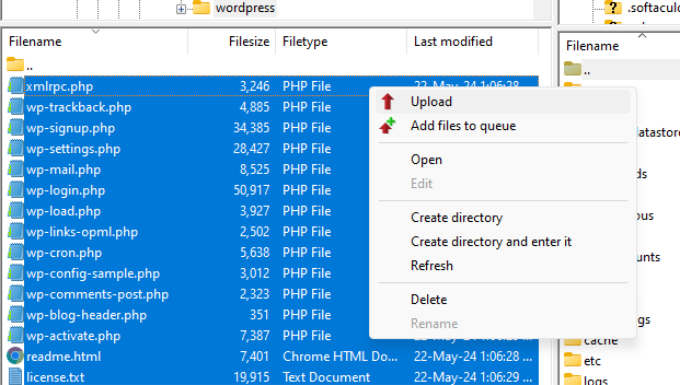
Sobald Sie die WordPress-Dateien hochgeladen haben, können Sie eine wp-config.php-Datei aus Ihrem Backup hochladen (nur wenn Sie sicher sind, dass die Datei sauber und nicht kompromittiert ist).
Alternativ dazu können Sie die Datei wp-config-sample.php in Ihren frisch hochgeladenen WordPress-Dateien in wp-config.php umbenennen. Danach müssen Sie die Datei wp-config.php bearbeiten und Ihre Datenbankinformationen eingeben.
Vergessen Sie nicht, die Datei zu speichern und sie wieder auf Ihre Website hochzuladen.
Als Nächstes müssen Sie andere Dateien aus Ihrem Backup hochladen. Wir empfehlen, dass Sie Ihre Bilder nur in das Verzeichnis /wp-content/uploads/ hochladen.
Nachdem Sie diese hochgeladen haben, besuchen Sie Ihre Website, um zu prüfen, ob alles einwandfrei funktioniert.
Als Nächstes müssen Sie sich in den WordPress-Administrationsbereich einloggen und mit der Installation der Plugins beginnen, die Sie auf Ihrer Website installiert haben.
Jetzt können Sie mit der Installation Ihres Themes fortfahren. Wenn Sie Ihr WordPress-Theme angepasst oder ein Child-Theme verwendet haben, können Sie es aus einem Backup wiederherstellen. Stellen Sie jedoch sicher, dass diese Dateien sauber sind.
Gehen Sie schließlich zu Einstellungen “ Permalinks und passen Sie die Permalinks-Einstellungen an Ihre Website an, und aktualisieren Sie dann die Permalinks.
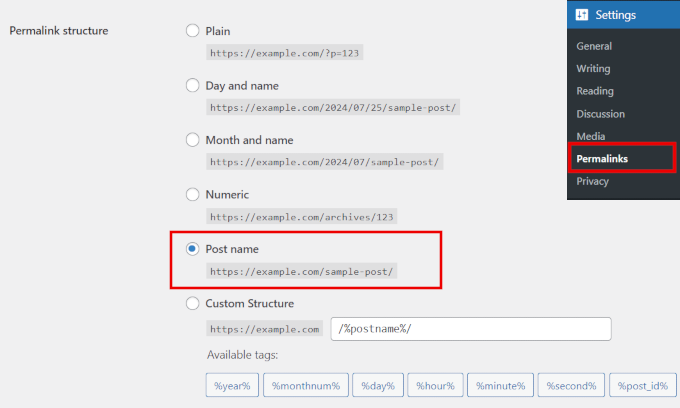
Fehlerbehebung bei WordPress-Backup-Wiederherstellungsproblemen
Wenn Sie die oben beschriebenen Anweisungen sorgfältig befolgen, werden Sie hoffentlich keine Probleme beim Wiederherstellen Ihres WordPress-Backups haben.
Es gibt jedoch einige häufige Probleme, auf die Sie bei der Wiederherstellung Ihrer WordPress-Website stoßen können. Hier sind unsere Anleitungen, wie Sie einige davon beheben können:
- So beheben Sie den Fehler beim Herstellen einer Datenbankverbindung in WordPress
- Wie man den WordPress White Screen of Death behebt (Schritt für Schritt)
- Wie man den 500 Internal Server Error in WordPress behebt
- Wie behebt man das Problem der Aktualisierung und Weiterleitung der WordPress-Login-Seite?
- Wie WordPress Posts Returning 404 Fehler zu beheben (Schritt für Schritt)
Andernfalls sollten Sie sich unseren ultimativen Leitfaden zu den häufigsten WordPress-Fehlern und deren Behebung ansehen.
Was Sie nach der Wiederherstellung Ihrer WordPress-Website tun sollten
Nachdem Sie Ihre Website erfolgreich wiederhergestellt haben, empfehlen wir Ihnen dringend, die Sicherheit Ihrer Website zu verbessern.
Falls Sie es noch nicht getan haben, sollten Sie regelmäßig ein Backup mit einem dieser WordPress-Backup-Plugins erstellen.
Um Ihre Website nach einem Hackerangriff zu schützen, empfehlen wir Ihnen außerdem, Ihr WordPress-Passwort sofort zu ändern. Wenn Sie eine Website mit mehreren Nutzern betreiben, ist es auch eine gute Idee, alle Nutzer aufzufordern, ihre Passwörter so bald wie möglich zu ändern.
Sie können auch eine Website-Firewall installieren, um Ihre Website vor künftigen Cyberangriffen zu schützen.
Bei WPBeginner verwenden wir Cloudflare, um unsere Website zu schützen, aber wenn Sie eine kleinere Website betreiben, kann Sucuri die Aufgabe vielleicht auch erledigen.

Weitere Einzelheiten finden Sie in unserem Leitfaden darüber, warum wir von Sucuri zu Cloudflare gewechselt haben.
Bonus-Tipp: Wenn Sie Hilfe bei der Erstellung regelmäßiger Backups Ihrer Website benötigen, können Sie unsere WordPress-Experten beauftragen. Mit der WPBeginner WordPress-Wartung erhalten Sie regelmäßige Cloud-Backups, 24/7-Support, Malware-Entfernung, Überwachung der Betriebszeit und regelmäßige Updates, damit Ihre Website reibungslos läuft.
FAQs zur Wiederherstellung von WordPress-Backups
Hier finden Sie einige häufig gestellte Fragen zur Wiederherstellung von WordPress-Backups:
1. Wie stelle ich meine WordPress-Website aus einem Backup wieder her?
Dies hängt davon ab, wie Sie Ihr WordPress-Backup erstellt haben. Wenn Sie ein Backup-Plugin wie Duplicator Pro verwendet haben und Zugriff auf das WordPress-Admin-Dashboard haben, sollten Sie es mit wenigen Klicks wiederherstellen können.
Wenn Sie das Backup jedoch manuell erstellt haben oder keinen Zugriff auf das Backend Ihrer Website haben, müssen Sie es manuell über das Control Panel Ihres Hosting-Providers oder das File Transfer Protocol (FTP) wiederherstellen.
Wenn Sie Ihre Website nach einem Hackerangriff oder einer Cyberattacke wiederherstellen, müssen Sie möglicherweise auch alle beschädigten Dateien Ihrer Website löschen und WordPress neu installieren, bevor Sie ein sauberes Backup wiederherstellen.
2. Wo werden meine WordPress-Backups gespeichert?
Wenn Sie ein Backup-Plugin verwenden, erstellt es einen Standardspeicherort auf Ihrem Hosting-Server, an dem die Dateien gespeichert werden. Normalerweise ist dies der Ordner wp-content. Abhängig von Ihrem Backup-Tool können Sie jedoch auch andere Cloud-Speicherdienste wie Google Cloud, Dropbox oder One Drive wählen, um Ihre Backups zu speichern.
3. Speichert WordPress Backups?
Leider bietet WordPress keine automatischen Backups an. Sie können WordPress-Backups manuell über das cPanel Ihres Hosting-Anbieters oder einen FTP-Client erstellen. Wenn Sie einen einfacheren Ansatz suchen, können Sie auch ein Backup-Plugin verwenden. Einige Hosting-Anbieter bieten auch die Möglichkeit, Backups automatisch zu erstellen.
4. Kann ich eine alte WordPress-Website wiederherstellen?
Ja, Sie können bestimmte Teile Ihrer WordPress-Website wiederherstellen, z. B. einzelne Seiten oder die Datenbank. Wenn Sie regelmäßig komplette Backups Ihrer Website mithilfe eines Plugins erstellen, können Sie sogar eine alte Version Ihrer gesamten Website wiederherstellen. Sie müssen lediglich eine bestimmte Uhrzeit und ein bestimmtes Datum auswählen, an dem Sie WordPress wiederherstellen möchten.
Wir hoffen, dass dieser Artikel Ihnen geholfen hat zu lernen, wie Sie WordPress aus einem Backup wiederherstellen können. Vielleicht interessiert Sie auch unsere ultimative Schritt-für-Schritt-Anleitung, wie Sie eine WordPress-Site in Dropbox sichern und wie Sie Google Drive mit Ihrer WordPress-Mediathek verbinden.
Wenn Ihnen dieser Artikel gefallen hat, dann abonnieren Sie bitte unseren YouTube-Kanal für WordPress-Videotutorials. Sie können uns auch auf Twitter und Facebook finden.





Bajrang
Let’s suppose, I am restoring 2 days ago file backup, then is it mandatory to restore database backup of the same date also in order to sync both??
WPBeginner Support
It would depend on what file you’re restoring from and for what reason as some backup plugins include database information.
Admin
Daniela
Hello. If I install a backup, will I lose all the changes I made and plugins I installed after the backup? Thanks!
WPBeginner Support
It depends on the backup tool used but normally, yes you would lose any changes not backed up.
Admin
Neha
Hey. Can i restore my site backup if i have only sql file?
WPBeginner Support
You will be missing some things but you will have the ability to restore a good amount of your content.
Admin
KylieM
We’ve only just realised that a page was permanently deleted (not in trash) that we need to recover. We completely updated our website a few months back and believe the page was deleted then. We did do a full back up before changes. Only want to recover the one page and not do a full restore which would replace all of our new content.
How would we do this?
WPBeginner Support
It would depend on what you used to create the backup but the simplest method may be to create a local installation for your site, restore your site on to your local install, then export the page you want on your live site so you can import it.
Admin
Siraj
Very useful tips. Restoring wordpress site through Cpanel is illustrated well. Thanks for sharing.
WPBeginner Support
You’re welcome, glad you like our guide
Admin
bhanuka
I was referring to uploading via FTP method. But my old files did not load. Only a blank page came. With some nail biting hours I realised that the wp-config.php file includes following important settings to be set with old site values.
1. database prefix. I had a custom prefix. If you dont change, WP upgrade will recreate all tables with ‚wp‘ prefix while your old data are in old prefix tables.
2. Authentication Unique Keys and Salts settings must match the old values
Then it worked
WPBeginner Support
Thank you for clarifying, glad you were able to find the root of your issue and resolve it.
Admin
Pawan Sharma
I was hosting my website through hostinger free hosting. Now i moved to another service provider. I took backup from hostinger and uploaded the same in new provider c panel under public_html. But my website not displayed. I’m getting below Error and Warning.
Warning: require(/home/test/public_html/wp-includes/rest-api/endpoints/class-wp-rest-autosaves-controller.php): failed to open stream: No such file or directory in /home/test/public_html/wp-settings.php on line 232
Fatal error: require(): Failed opening required ‚/home/test/public_html/wp-includes/rest-api/endpoints/class-wp-rest-autosaves-controller.php‘ (include_path=‘.:/usr/share/php‘) in /home/test/public_html/wp-settings.php on line 232
And don’t find any wp-settings.php file under the root folder piblic_html.
Please help to solve this problem.
Thanks all
WPBeginner Support
For that, you would want to take a look at: https://www.wpbeginner.com/wp-tutorials/how-to-fix-the-wordpress-failed-to-open-stream-error/
if you are missing the file then you could try manually adding the WordPress files:
https://www.wpbeginner.com/wp-tutorials/how-to-manually-update-wordpress-using-ftp/
Admin
glenda
I’m not a beginner, but am desperately trying to find out how to get past the first screen if I can’t remember my importbuddy.php password. The last WP Core update broke one of my sites and the most recent backup had a fatal error so I had to go back to an old, old backup. iThemes support used to be good, but now it sucks.
Found your explanation for using BackupBuddy and it’s a good one.
ted
Thank you for the article.
I have a „different“ problem:
I have only the httpdocs directory and the
wordpress_d database directory (located at var/lim/mysql)
How can I restore the site with these 2 directories?
Thank you!!
Kawsar Siddik
Backupbuddy is the best WordPress restore/migration tool while working on client’s website. It saves time. Thanks for sharing this tutorial.
Clever Peterson
Hello, I backed up my WordPress site with Drop box for WordPress but I’m still confused of where to upload the back up files I have downloaded. Would you please help me?
Eddy
I successfully restored my WordPress using phpmyadmin. However when I try to install WordPress using the new database info it says the db already exists, use another name. What do I do?
WPBeginner Support
Hi Eddy,
Make sure that you are using a different name for your new database.
Admin
Mudass Iftikhar
your article always helped me
Roxanne
I delete my wordpress site, but I made a back-up before I deleted it. Now I want to re-open the website. Is there a way to just upload the back-up and get everything back to the same way it was?
WPBeginner Support
Hey Roxannne,
Depends on how you made the backup. You will still have to setup database unpack WordPress files and upload them.
Admin
Nicolau Nicoleta Mihaela
I have the same question, backup created with cPanel. Thank you I advance for an answer
Vikas
Hi I am trying to restore my wordpress site from bck but after I click upload on restore MySQL database option….dead white screen comes up and nothing happens! Any suggestions? Thanks
Vikas
I have not taken any backup of my site. And my site is displaying „Access Denied“. And my hosting provider states that my files in that website have been attacked by malware. Is there any method to recover all the data from the hosting ?
WPBeginner Support
Hey Vikas,
You can download your data using FTP and your database using phpMyAdmin.
Admin
Vikas
After downloading the data, should i delete everything and should i put it again ? If so will the problem get solved ?
joseph
I am new to blogging. I want to say thanks for your simplified tutorials, it is helpful. I already bookmarked your site so I can always come back. Once again i say thank you.
nicolas blake
can you please tell me how i can access a backup i made with backwpup and I chose „folder“ .I once was a programmer now I’m just a duffer
Nate
I just got a cpanel full backup from a client. They are now using Godaddy WordPress managed hosting. How in the heck do I restore the site and database to Godaddy from the TAR.zip file?
Thanks guys!
Hari Kumar
My blog is live and can login to admin dashboard. but none of my post is available, and I cannot update my previous post. Plus new post added are not found… while opening.. it says —- a 404 Not Found error was encountered while trying to use an ErrorDocument to handle the request.
Any Solution??
Jamie
Thanks for the information. Just a question: I have a SQL database backup for my blog saved as a .SQL file. What information does this contain? Does it have the theme customised layout? Blog articles? Pictures?
Many thanks
Soibibo
My site just crashed. I can’t access my wp admin dashboard. What do you suggest I do?
WPBeginner Support
Please see our beginners guide on troubleshooting WordPress errors.
Admin
Mr. Karmaker
My website has been hacked. I have made earlier backup zip file in cPanel FileManager. Zip file size is more than 99MB and it can not upload.
How to restore my site ?
Any suggestion please.
dana
Hi, We recently moved some but not of our blog content from a standalone site to the company website. The posts that we didn’t think we wanted are now in FTP — I’d like to import them to a new wordpress site. Trying to locate specific content within FTP Is a huge pain. Is there any way to export that content into a new wordpress site so I can access it? Thank you.
Prudhvi Raj
Good.
I’ve backed up Home Directory and restoring it, and also uploaded the whole website. it’s like 20 minutes it is saying „restoring files…“ . How long does it takes? File is of 1.45GB . Thanks .
Mufaddal
Hi there, I want to change my hosting plan from hostgator(HG) to Digitalocean(DO). I have done the setup of DO successfully, how can I get my backup uploaded?
I have taken a backup of WP site(the file was around 32mb) I m not sure its the whole backup, now my HG plan has expired(not deleted, I can renew it to get my site back) but now what should I do to upload the data, on adminMyPhp it is showing some error while uploading data. I want my site back as it was, on DO server, I dont want to renew my HG plan again, Please guide me, Thank you in advance.
Keesjan
hi,
do you know how to restore a backup when the admin interface is broken?
Then its not possible to use the interface.
Is in that case only the phpadmin method the way to go. Or are there any cloud service out there that help me ‚push‘ teh bakcyp back to my site, without loggin in mt wp admin?
WPBeginner Support
You will have to do it manually. You can also hire professionals to do that for you. They will also take the phpMyAdmin approach.
Admin
Mahriya
Thanks, what if I had backed up my whole WordPress site(tags, posts media etc…) but only wanted to restore the Media only. Is there any way to do this? I appreciate the help!
WPBeginner Support
It depends on what method you used to create a backup. Most WordPress backup plugins store all your WordPress files in a zip file. You can extract that file to your computer and then upload the wp-content/uploads folder.
Admin
Belinda
Hello,
Total beginner here.
Started building my first WordPress site for a client on my local drive. Used the theme Avada.
Long story short, I needed a new hard drive in my Mac.
– Backed up my failing hard drive with time machine.
– Starting fresh on my computer with a new hard drive.
– Reinstalled WordPress and MAMP.
– Moved the website files from time machine applications/MAMP/htdocs to the same place on my computer.
Reading above I need to do something with the database. But I am completely lost on this.
Please help as soon as possible!
Thank you in advance.
WPBeginner Support
Go to Applications/MAMP/db/mysql/ copy the contents and paste them in your new drive MAMP install on the same location.
Admin
tonythanh
The problem when we restore wordpress is all image will not display. I have already got this trouble and it made me 3 days for resolve. Here is the way I solve for my site
1. Install fresh copy of wordpress with new database
2. Drop all database in phpmyadmin
3. Import database that you back up lastime
4. Your site will not work and It need reinstall. Don’t worry.
5. Login Cpanel, find the wp-config.php file, open, change the prefix wp_ with your new prefix of your last database.
6. Import your images correct to the folder in uploads.
7. Done, your site will work well with full images.
I hope you will get no trouble like me.
Graceson
Can you please assist me to restore backedup files using „BACKUPWORDPRESS“ in my local drive?
Thanks in advance.
Tushar
Is the method of using FTP to restore your website valid/useful if the main error in FTP is „552-Quota exceeded“ . I contacted the host, he says that some malicious plugin has caused this sort of error to occur and complete restoration of the site will be required. I planning to begin from a clean slate by uploading new wordpress and redesigning the entire site: But will this work with above mentioned error?
Angel
Thanks a lot for the article! You saved my life helping me to restore a site, easy and simple!
All the best, Angel
Paul
Hi, just a (probably) silly question: can I Re-install now from the wordpress dashboard without losing any settings etc on my site?
WPBeginner Support
You can go to Dashboard -> Updated and click on reinstall now button. That will download a fresh copy of WordPress and replace your old files. It will not change your WordPress settings as those are stored separated in database.
Admin
Ben Dixon
Hi guys, very informative read, thanks for that!
I have a backup of my SQL database which was created with a plugin and emailed to me. Unfortunately I’ve lost all other files, I’ve contacted my host and they have no backup.
I’ve installed WordPress and will install the appropriate theme. I can’t recall all the plugins I used.
I’ve obviously lost all my images, but what else have I lost? Is a restore of my site feasible in your opinion?
Many thanks for any help at all.
WPBeginner Support
Yes a restore of your site is feasible.
Since you do not have backup of your files, so you will be unable to restore images. Some plugins may also misbehave.
Admin
Ben Dixon
Thanks for that, I’ll give it go. Maybe I can look at the database to help me remember what plugins were there before.
Cheers guys!
Ali Sajjad
Hi, i have done everything and my site is running fine. but i have problem with images all over the site. i don’t know why, because there is no error display during restore process.
Zamby
Somewhat complicated question. A few days ago, I updated the wordpress version my site was using. This then made the site fail, and I couldn’t even log in to wordpress due to a fatal error. I then replaced the site with my most recent backup from Feb. 2nd, and things were fixed. However, there is a lot of data from Feb. 2nd that I would like to access if possible.
This data must have been saved somewhere, but I’m wondering where? Or is it all completely lost and innaccessible in the Cpanel after a backup?
WPBeginner Staff
It actually depends on how you restored your backup. If you created a new database to restore your backup into and did not delete any files from your webserver then you can get access to your posts by opening the old database using phpmyadmin. You can also find the files you uploaded on your webserver by connecting to your site using an FTP client. These file uploads will be stored in /wp-content/uploads/ folder.
On the other hand, if your restoration process involved deleting old database by emptying it, and if you deleted old files from server as wel, then you cannot access those files on your own.
Another possibility to recover that data is by requesting your web host and ask them if they have a backup for your site on the specific date when you deleted all old data. If they have the backup, then they can send it to you.
WPBeginner Staff
Simply click on Appearance » Themes and click on the activate button on the theme that you had previously installed. In case you can’t figure out which theme you had previously installed, then you will need to activate them one by one and preview your website until you get the right theme.
Urgent help needed @ WPBEGINNER SUPPORT
Good day Wpbeginner,
This is my terrible situation. I made a mistake and i lost my site. and then i requested my Host gator India to give back file for which i paid. They send me in TAR.Zip file. I don’t know how to go about it. They told me to long CP panel and upload and extract. But it didn’t work. Then one rep who helped me and my site came alive. However, if i click any one of the posts it was throwing 403 error. She couldn’t solve it. and another rep said i need to contact my developer…what is this? Develper,!!!(lol)
and then i moved another host. I tried uploading my back up file. but no use and nothing working. So i had 3 months back up files which i downloaded from WordPress XML. Now it is working except images and the current template is different than the previous.
I have the back up file from Hostgator and if you could help me how to go with it…i really appreciate.
Best regards,
Ramesh.ramaiah
WPBeginner Support
You can extract the backup file on your own computer using a program that is able to extract .tar and .zip archives like 7zip. After that you can browse the files and upload them to your web server using an FTP client.
Admin
Timothy
I was wondering how to recover a WordPress theme, it wasn’t deleted I just hit active on a new on by accident
Gary
Hello, I just stumbled upon this post and was wondering if you could help. I switched hosting plans within godaddy and went from managed wordpress to cpanel. I used a plugin to backup the site before switching, which saved all files including the .sql file. Restoring the site via the plugin did not work so I am trying it the hard way. I have completely removed the site including all files. Then I created a new database and gave it the same name as database_name in the .sql file. Afterwards I uploaded the .sql file from the backup into this database. Then I reinstalled wordpress via cpanel and chose the new database I created. Then I uploaded the rest of the files(themes, plugins, uploads) via ftp. But for some reason this did not do anything. When I logged into wordpress nothing looks different. None of the pages I created or anything was there. The plugins were there and the theme I uploaded was there. However, I can’t access the images from the media button even though they are in the uploads folder. I can’t figure out where I went wrong. The database names match up, I can’t think of anything else. The only thing I can possibly think of is the hostname in my .sql backup file is not localhost. Could that be the issue? I can’t figure out what I am missing. Any help would be greatly appreciated.
DFPhoenix
If your database was correctly restored, you won’t even need to install wordpress again. Asking you to install means, your database isn’t correctly restored. Just my guess.
Dill
Hi… I was wondering how to restore my wordpress site if all I have is a complete download of everything that was there. I downloaded everything (everything!) from my host using FTP and didn’t do any fancy backups of databases. Can I just upload that entire backup as is and get the site back? I’m also switching hosts (but not domain names), so I do know I’ll have to edit a file or two also.
WPBeginner Support
If you only copied everything from FTP then you probably only have your WordPress files and not the database. Without the database backup you can not restore your site. If you have access to your host, then please create your database backup.
Admin
Kyle
Hi,
Thanks for all your tutorials, I find myself here often. I had a question, is there any way to retrieve the subscribers from a backed up .sql file? The plugin used to collect subscriptions was Subscriber 2.
Bruno
Your site is great. Can you write a guide how to restore a backup created with BackWPup? That would be great.
WPBeginner Support
Sure we will try to do that. Meanwhile, here is how to restore your backup created with BackWPUp plugin. Download your backup file and extract it. Inside it your will find a .sql file along with other files. .SQL file is your database backup and you can import it using phpMyAdmin. Upload rest of the files using FTP.
Admin
tuyen ran
how to show my password on file database backup from backupbuddy? It is encryption!. thanks you!
Raji
This post is extremely helpful as it has helped me (a newbie) to restore my site….or almost. When i try to login, it takes me to a page that says i should install wordpress again…. the famous 5minutes install. please help.
WPBeginner Support
It seems WordPress is unable to connect to the database. Or it connected to the database which is currently empty. You have restored your WordPress files but you probably didn’t restore your WordPress database backup successfully.
Admin
Md Jafrul Islam
Thank you very very much. By this info post detail. I can make my site again restore. Thanks Man. Just awesome update more amazing info.
Chris
When doing a backup, which backup do I need most frequently? I am offered three choices on the cPanel (full cPanel backup, home directory, database). Would you say it is more important to backup the database file, as long as I have a fairly recent backup of the home directory?
Thanks for your time!
WPBeginner Support
Depends on how often your site gets updates like comments, posts, media uploads, we would say that you should always set a high priority for database backups
Admin
Bas
Thanks for the great guide(s). I had to move 2 sites from 1 server to a new server, and using your manuals it went like clockwork.
Making the backup via BackWPup was quick and restoring it manually the same.
I was up and running again in 15 minutes.
BTW. The version of BackWPup I use (3.0.13) only showed the Dropbox feature after creating, saving and running the backup job.
I had to change something, when the sites where moved, and there it was.
Naik
Hi,
I recently shifted my blog from one hosting to another in Godaddy. I have the backup of my blog in .sql format. I am trying to import using MySQL, it shows an error „Script timeout passed, if you want to finish import, please resubmit same file and import will resume.“ Please help
WPBeginner Support
Did you try resubmitting the same file again to resume import?
Admin
Brenda
I have been able to follow the instructions above for restoring my wordpress database using cpanel by dropping the tables in the current database and replacing them with the backedup database.
However I can’t work out how to do it if I create a new database – the article says to go into mysql within cpanel and set up a new database, password etc but how do I link the new database to the files that I have reinstalled?
Thank you
WPBeginner Support
Brenda, connect to your website using an FTP client like filezilla, download wp-config.php file from your website’s root directory create a backup of it by simply making a copy of it. Open it in a text editor like notepad. and enter your database name, database user name, database password, and host (usually localhost). Save the file and upload it back to your website.
Admin
Brenda
Thanks. I have done that but when I try to access the site I get „Error establishing a database connection“
I did what you said and replaced the original wp-config file with the new version.
What else do I need to do to be able to use the new version of the database, rather than the original one?
Brenda
Sorry, some more information that might clarify what is happening. When I try, as suggested in your article, to access the wp-admin url I get an error message that starts with the following:
We were able to connect to the database server (which means your username and password is okay) but not able to select the NAME database.
Brenda
Sorry, some more information that might clarify what is happening. When I try, as suggested in your article, to access the wp-admin url I get an error message that starts with the following:
We were able to connect to the database server (which means your username and password is okay) but not able to select the NAME database.
At the bottom it says: On some systems the name of your database is prefixed with your username, so it would be like username_webgyzec_replacewp1. Could that be the problem?
That is indeed the case. So what do I need to change please to get this to work?
Brenda
OK I can stop sending messages now. Silly error on my part but now everything is working.
Thank you SO much for such a helpful article.